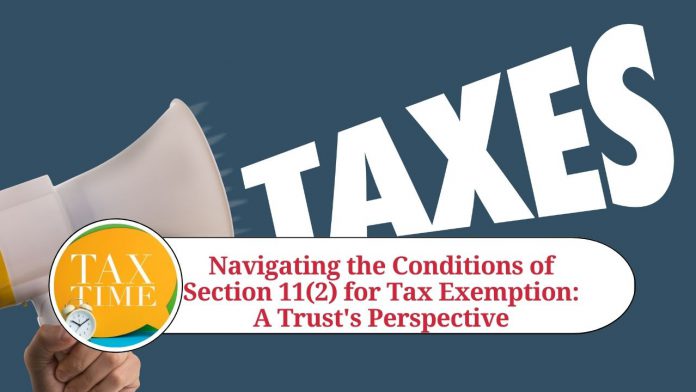Section 11(2) of the Income Tax Act pertains to income earned by a trust from its investments. It specifies the conditions under which such income is exempt from taxation. In this blog post, we will explore the details of this provision and its implications for trusts in India.
What is Section 11(2)?
Section 11(2) of the Income Tax Act exempts the income of a trust or institution from tax if it is derived from investments made in government securities, bonds, debentures, and other securities specified by the Central Government. However, certain conditions need to be met for this exemption to apply.
Conditions for exemption
The following conditions must be satisfied for the income of a trust to be exempt under Section 11(2):
- The trust must be registered under Section 12A: To claim an exemption under Section 11(2), the trust must be registered with the Income Tax Department under Section 12A. This registration is necessary to establish the trust’s status as a charitable or religious institution.
- Income must be applied for charitable purposes: The income derived from investments must be applied towards the charitable purposes of the trust. This means that the income cannot be used for any other purpose, such as payment of salaries, bonuses, or other expenses that are not related to the trust’s charitable activities.
- Accumulation of income: The trust can accumulate up to 15% of its income derived from investments for application toward charitable purposes in subsequent years. This is known as the “accumulation of income” provision.
- Return of income: The trust must file its income tax return promptly, as per the provisions of the Income Tax Act.
Implications for trusts
Section 11(2) of the Income Tax Act has significant implications for trusts in India. It provides a tax exemption for the income earned by a trust from its investments, provided that the income is applied towards charitable purposes. This exemption can help trusts to save a significant amount of money that would otherwise be payable as income tax.
However, it is important to note that the exemption is not automatic and must be claimed by the trust by filing its income tax return. Further, the trust must ensure that its investments are made in securities that are specified by the Central Government, to qualify for the exemption.
Investments eligible for exemption
The investments that are eligible for tax exemption under Section 11(2) are specified by the Central Government. These include government securities, bonds, debentures, and other securities that are notified by the government from time to time. Trusts must ensure that their investments are made in securities that are eligible for the exemption to qualify for the tax benefit.
Final Conclusion
In conclusion, Section 11(2) of the Income Tax Act provides a tax exemption for income earned by trusts and institutions from their investments, subject to certain conditions. This exemption can be beneficial for trusts in reducing their tax liability and enabling them to allocate more funds toward their charitable activities. However, trusts must ensure that they comply with the conditions specified under Section 11(2) and invest in eligible securities to claim the exemption.
Read more useful content:
Here are some frequently asked questions (FAQs) related to Section 11(2) of the Income Tax Act:
Q: What is Section 11(2) of the Income Tax Act? A: Section 11(2) of the Income Tax Act is a provision that provides for a tax exemption for income earned by trusts and institutions from their investments, subject to certain conditions.
Q: What are the conditions for exemption under Section 11(2)? A: The conditions for exemption under Section 11(2) are:
- The trust must be registered under Section 12A of the Income Tax Act.
- The income derived from investments must be applied towards the charitable purposes of the trust.
- The trust can accumulate up to 15% of its income derived from investments for application toward charitable purposes in subsequent years.
- The trust must file its income tax return promptly.
Q: What types of investments are eligible for exemption under Section 11(2)? A: Investments eligible for tax exemption under Section 11(2) include government securities, bonds, debentures, and other securities that are notified by the Central Government from time to time.
Q: How can a trust claim the exemption under Section 11(2)? A: A trust can claim the exemption under Section 11(2) by filing its income tax return promptly and complying with the conditions specified under the provision.
Q: What are the benefits of the exemption under Section 11(2)? A: The exemption under Section 11(2) reduces the tax liability of the trust, allowing it to allocate more funds toward charitable activities. It also provides an incentive for donors to contribute to the trust, as donations to a charitable trust are eligible for tax deductions under Section 80G of the Income Tax Act.
Q: What are the consequences of non-compliance with the conditions under Section 11(2)? A: Non-compliance with the conditions under Section 11(2) can result in the trust losing its tax-exempt status and being liable for income tax on its investments.
Q: Can a trust claim exemption under Section 11(2) for the income year from sources other than investments? A: No, Section 11(2) applies only to income earned by a trust from its investments, and not to other sources of income.




















